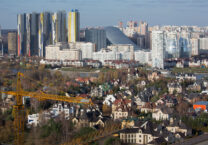
A photo illustration of Henry Ford, left, and Elon Musk, right.
Photo illustration: Elise Swain/The Intercept; Photos: Getty Images
Elon Musk is on his way to becoming the next Henry Ford.
That is not a compliment.
In his early entrepreneurial years, Ford was a revolutionary: an innovative genius who transformed the way Americans traveled, worked, and lived. Ford effectively created the modern assembly line, driving down manufacturing costs, raising productivity, and making it possible to sell cars at low prices. Ford’s inexpensive and durable Model T, introduced in 1908, brought automobiles within the reach of average Americans. Ford dominated the car industry as a result; in the early 1920s, more than half the cars on the world’s roads were built by Ford.
Following in Ford’s footsteps, Musk has become the leading innovator in the 21st century auto industry. Thanks to the successful line of electric vehicles produced by his company, Tesla, Musk has challenged a century of rigid orthodoxy — dating back to Ford — that proclaimed the gasoline-powered engine king of the road. By taking on the corporate giants of the auto industry and winning, Musk has succeeded where other flamboyant and egocentric entrepreneurs like John DeLorean, who briefly built the 1980s-era gull-winged car now mainly remembered for its time-traveling role in the movie “Back to the Future,” failed.
Unfortunately, Elon Musk now seems grimly determined to walk Henry Ford’s path much further than he should, for after his spectacular early success, Ford turned very dark, very quickly. The consequences of his hateful actions continue to poison the world today.
After he had accumulated massive wealth and achieved global fame, Ford allowed bigotry and paranoia to dominate his life. Deeply anti-union, he created a network of company spies who surveilled his employees and tried to control their lives. He also bought a newspaper that disseminated lies and antisemitic conspiracy theories. He followed that up by publishing a series of antisemitic books that were influential among Nazis and other European fascists between the First and Second World Wars.
Ford became a favorite of Adolf Hitler, who kept a photo of the automaker in his office. “I regard Henry Ford as my inspiration,” Hitler told the Detroit News in 1931.
The Ford Motor Company eventually began to decline as a result of its owner’s hateful and erratic behavior; it was saved only when Ford was forced to turn over control to his grandson.
Musk seems to be on the same trajectory that led Ford into the abyss. Tesla investigators hired by Musk allegedly hacked an employee’s phone and spied on his messages, and the stridently anti-union Musk reportedly hired a public relations firm to investigate an employee Facebook group just as Tesla workers were trying to unionize.
Earlier this year, SpaceX, another firm that Musk controls, fired employees who had written a letter calling on SpaceX to condemn Musk’s tweets, in which he’d ridiculed reports that SpaceX had settled a sexual harassment complaint against him. After Musk acquired Twitter in October, he began slashing the company’s workforce — including firing employees who had dared to criticize him.
Now, like Ford, Musk is going further, enabling right-wing hate on a massive scale.
After buying a social media platform whose reach far exceeds the newspapers of Henry Ford’s era, Musk is rapidly turning Twitter into his personal plaything, making a series of arbitrary moves to showcase his right-wing political agenda. He has unblocked the Twitter accounts of Donald Trump and other right-wing extremists, and ended enforcement of the site’s Covid misinformation policy. QAnon accounts are now returning to Twitter too.
Musk has also looted the platform’s internal files to further his political goals. Last week, he suspended the Twitter accounts of journalists at The Intercept and elsewhere who have criticized him, and then tried to make demands on the journalists in return for lifting the suspensions. Over the weekend, he briefly suspended the account of Washington Post reporter Taylor Lorenz after she tried to contact him for a story.
“Elon Musk has demonstrated to the entire world in the space of a few weeks that his management of Twitter is a disaster for the right to information,” Reporters Without Borders said in a statement after Musk suspended the reporters’ accounts. Officials from the European Union have also warned that Twitter may face sanctions for failing to live up to the EU’s standards for press freedom.
Musk has embraced Russian dictator Vladimir Putin and in October showed his willingness to become Putin’s de facto messenger to the West by laying out specific pro-Russian terms for a settlement of the war in Ukraine. On Sunday, Musk was photographed at the World Cup in Qatar, standing in what appeared to be a stadium suite with Donald Trump’s son-in-law, Jared Kushner.
If Henry Ford’s life is any guide, the hate Musk is now unleashing will continue to spread long after he’s gone. A century after it was published, references to Ford’s book, “The International Jew,” can still be found on white nationalist, pro-Nazi and antisemitic websites.
Like Ford, Musk is playing with right-wing fire just as his auto company is about to come under siege. Automotive experts now predict that Tesla will see its share of the electric vehicle market drop from 70 percent to 11 percent by 2025 as a result of increased competition from the world’s major carmakers. General Motors, Ford, Volkswagen, and other big firms are set to enter the electric vehicle market with a combined total of 135 new models, and to begin large-scale production over the next two to three years.
Even Ford Motor Company — which survived Henry Ford — plans to produce two million electric vehicles a year by 2026.
The post Henry Ford, Elon Musk, and the Dark Path to Extremism appeared first on The Intercept.

 1 year ago
87
1 year ago
87


